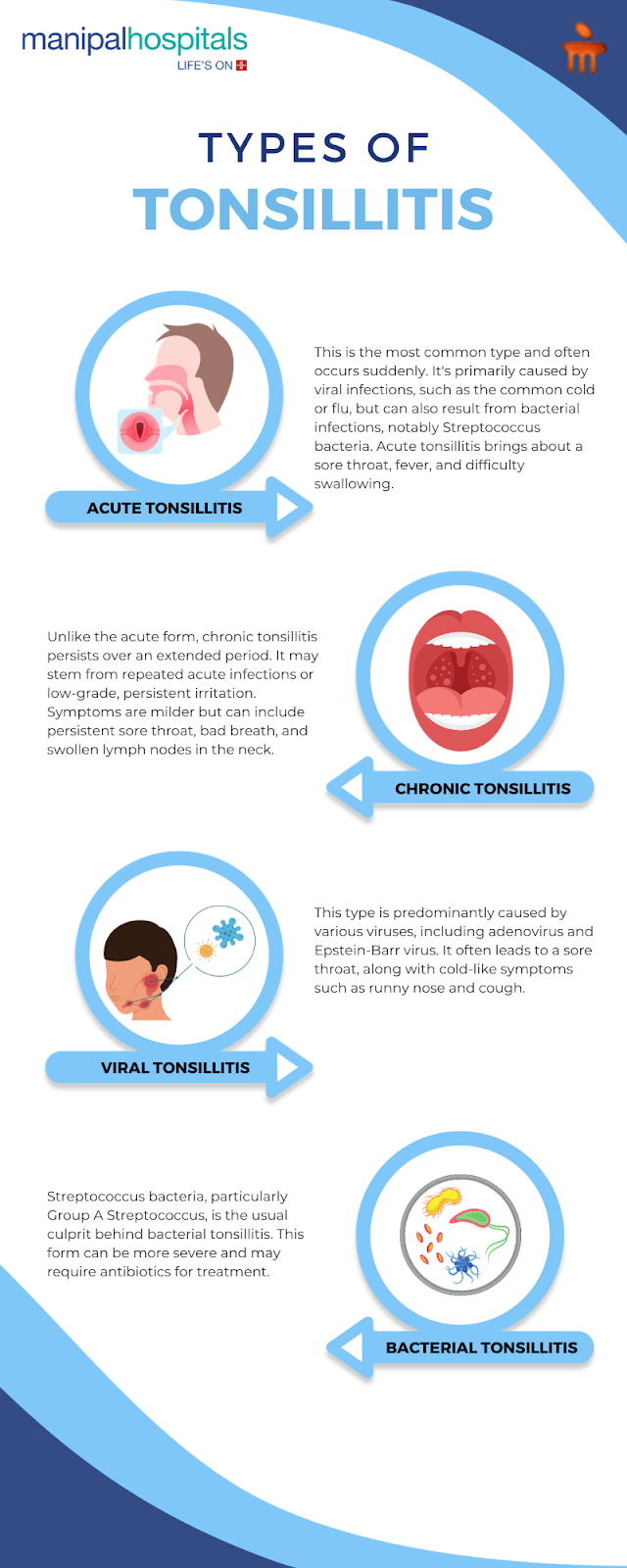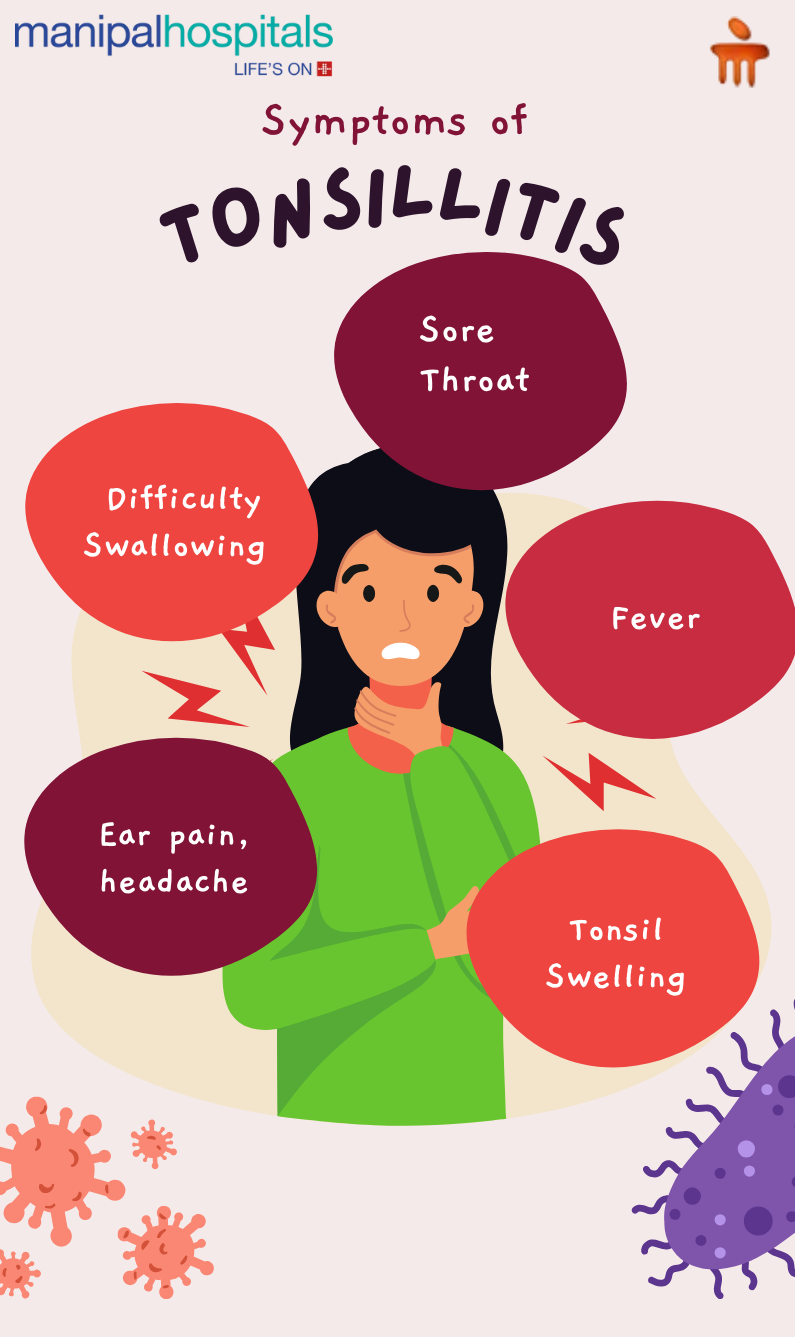
Picture this! You wake up one morning with a scratchy, painful throat, making even swallowing a challenge. You may wonder, what's causing this discomfort? The answer could very well be tonsillitis.
Tonsillitis is more than just a mouthful; it's a common and often bothersome condition that affects people of all ages. But what exactly is it? In essence, tonsillitis is the inflammation of the tonsils, those two small, oval-shaped masses of tissue located at the back of your throat. These glands, known as your tonsils, play a crucial role in your immune system, but when they become infected, they can become your body's arch-nemesis.
In this blog, we'll provide you with detailed information on tonsillitis. We'll delve into the ins and outs of this condition, exploring its causes, symptoms, and how it can turn a simple sore throat into a major annoyance. So, if you've ever wondered what's behind that persistent throat discomfort, read till the end.
Exploring the Various Types of Tonsillitis
Tonsillitis can be present in different forms, each with its characteristics and underlying causes. Understanding the types of tonsillitis is key to effective diagnosis and treatment.

Here, we'll delve into four main categories:
-
Acute Tonsillitis: This is the most common type and often occurs suddenly. It's primarily caused by viral infections, such as the common cold or flu, but can also result from bacterial infections, notably Streptococcus bacteria. Acute tonsillitis brings about a sore throat, fever, and difficulty swallowing.
-
Chronic Tonsillitis: Unlike the acute form, chronic tonsillitis persists over an extended period. It may stem from repeated acute infections or low-grade, persistent irritation. Symptoms are milder but can include persistent sore throat, bad breath, and swollen lymph nodes in the neck.
-
Viral Tonsillitis: This type is predominantly caused by various viruses, including adenovirus and Epstein-Barr virus. It often leads to a sore throat, along with cold-like symptoms such as runny nose and cough.
-
Bacterial Tonsillitis: Streptococcus bacteria, particularly Group A Streptococcus, is the usual culprit behind bacterial tonsillitis. This form can be more severe and may require antibiotics for treatment.
Identifying the specific type of tonsillitis is essential for determining the most effective treatment approach, whether it involves rest, antibiotics, or, in severe cases, surgical intervention. If you or a loved one are experiencing symptoms of tonsillitis, get expert guidance and care from the experienced doctors at Manipal Hospitals.
Tonsillitis Causes
Tonsillitis can be triggered by various factors, with the primary culprits being Streptococcus bacteria and viral infections. Let's dive into the causes:
1. Streptococcus Bacteria: Among the bacterial causes, Group A Streptococcus bacteria are the most notorious. When these bacteria invade your throat, they can lead to a severe form of tonsillitis called Streptococcal tonsillitis, characterised by a sudden onset of symptoms.
2. Viral Infections: Viruses such as the common cold, influenza, adenovirus, and Epstein-Barr virus are frequent perpetrators of viral tonsillitis. They lead to inflammation of the tonsils, contributing to the discomfort.
Symptoms of Tonsillitis
Tonsillitis doesn't go unnoticed; it comes with a set of unmistakable symptoms.

Here's what to watch out for:
-
Sore Throat: A persistent, painful sore throat is the hallmark symptom of tonsillitis. It can make swallowing, talking, or even breathing uncomfortable.
-
Difficulty Swallowing: As the tonsils become inflamed and enlarged, you may experience difficulty swallowing, leading to discomfort and reduced appetite.
-
Fever: Tonsillitis often accompanies fever, particularly in cases caused by bacterial infections. Elevated body temperature is your body's response to the infection.
-
Tonsil Swelling: Inflamed tonsils can swell to the point where they obstruct your throat. This can lead to snoring, difficulty breathing, and even sleep disturbances.
-
Other Symptoms: Tonsillitis may also bring about bad breath, ear pain (referred pain from the throat), headache, and a general feeling of malaise or fatigue.
Recognising these symptoms is the first step towards seeking timely medical attention. Whether your tonsillitis is bacterial or viral, prompt diagnosis and tonsil stones treatments with appropriate care, often guided by the experienced healthcare professionals at Manipal Hospitals, can help you recover more comfortably.
Diagnosis and Treatment of Tonsillitis
Diagnosing tonsillitis involves a combination of methods to identify the underlying cause and severity of the condition:
1. Throat Swab:
A throat swab is a common diagnostic test for tonsillitis, especially when it's suspected to be caused by bacteria. During this simple procedure, a healthcare provider uses a cotton swab to collect a sample from the back of your throat. This sample is then sent to a lab for analysis to determine if bacteria like Streptococcus are present.
2. Physical Examination:
A thorough physical examination is often the first step in diagnosing tonsillitis treatment. Your doctor will examine your throat, neck, and lymph nodes to check for signs of inflammation, redness, or swelling, which are indicative of tonsillitis.
3. Tonsil Examination:
A close tonsil examination allows the doctor to assess the size and condition of your tonsils. Enlarged and inflamed tonsils are a key indicator of tonsillitis. Once the cause and severity of tonsillitis are determined, the appropriate treatment plan can be established. Treatment for tonsillitis varies based on the underlying cause and the severity of symptoms. Here are the main treatment options:
-
Antibiotics: If bacterial tonsillitis is diagnosed, your doctor may prescribe antibiotics to clear the infection. It's crucial to complete the entire course of antibiotics, even if you start feeling better sooner.
-
Home Remedies: For mild cases of viral tonsillitis or as supportive care alongside antibiotics, home remedies can provide relief. These may include rest, staying hydrated, gargling with warm salt water, and using throat lozenges or over-the-counter pain relievers.
-
Tonsillectomy: In cases of chronic or severe tonsillitis that don't respond to other treatments, a tonsillectomy may be recommended. This surgical procedure involves the removal of the tonsils. It's usually considered when tonsillitis significantly impacts your quality of life or becomes a recurrent issue.
Tonsillitis Prevention and Lifestyle Tips
While tonsillitis can be a discomforting ailment, taking proactive steps to prevent its occurrence is always a smart approach. Here are some key strategies and lifestyle tips to help you stay tonsillitis-free:
1. Good Hygiene:
Practising good hygiene is your first line of defence against tonsillitis. Regularly wash your hands with soap and water, especially after being in crowded places or touching surfaces that others have come into contact with. This helps prevent the spread of germs that can lead to infections.
2. Avoiding Close Contact:
Limit close contact with individuals who have a sore throat or respiratory infections. Tonsillitis is often contagious and can spread through respiratory droplets when an infected person coughs or sneezes.
3. Strengthening the Immune System:
A robust immune system is your body's natural defence against infections, including tonsillitis. Maintain a balanced diet rich in vitamins and minerals, get regular exercise, manage stress, and ensure adequate sleep to strengthen your immune system. Consider including immunity-boosting foods like fruits, vegetables, and probiotics in your diet.
4. Properly Manage Allergies
Allergies can contribute to throat irritation and inflammation. Managing allergies through appropriate medication and allergen avoidance can reduce the risk of tonsillitis flare-ups.
By incorporating these prevention and lifestyle tips into your daily routine, you can significantly reduce your chances of developing tonsillitis and enjoy better overall throat health.
Understanding tonsillitis, its causes, symptoms, diagnosis, and treatment options is crucial for maintaining good throat health. Whether you're adopting preventive measures like good hygiene and immune system support or seeking medical guidance from healthcare professionals, your proactive efforts can help minimise the risk of this uncomfortable condition. Remember that if you do experience symptoms of tonsillitis, timely medical attention can make a world of difference. By staying informed and taking appropriate steps, you can promote a healthy throat and overall well-being.





















 4 Min Read
4 Min Read











